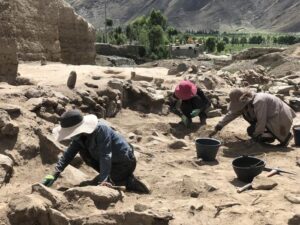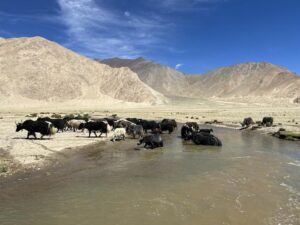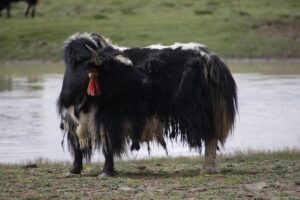
AMERICAN ASSOCIATION FOR THE ADVANCEMENT OF SCIENCE (AAAS)—New archaeological analyses of the remains of 193 yak, cattle, and their hybrids from recent excavations on the southern Tibetan Plateau reveal that these animals were likely domesticated and crossbred in the high-altitude region by at least 2,500 years ago. Present-day Tibetan herders frequently crossbreed domestic yak with non-native taurine cattle – a long-standing practice known to produce hardy hybrids that combine yaks’ endurance in harsh environments with the meat- and milk-producing capabilities of cattle. Although this practice is thought to extend back thousands of years, researchers have found limited archaeological evidence to constrain its introduction on the Tibetan Plateau. Genetic studies have offered clues about yak lineages, but it’s been difficult to distinguish between wild and domestic ancient yak remains. Recent excavations at Bangga, located about 3,750 meters above sea level on the southern Tibetan Plateau, uncovered remains of more than 10,000 mammals dated to between 3,000 and 2,200 years ago. From these remains, Ningbo Chen and colleagues identified 193 Bos specimens – including bones from 31 taurine (Bos taurus) or indicine (Bos indicus) cattle, and 13 wild or domestic yak, dated to between around 2,700 and 2,350 years ago. The researchers compared the genomes of 5 of these Bos specimens against 11 new genomes of modern Tibetan cattle, as well as previously published genomes of ancient and modern cattle and yak from across the region. Yak remains found at Bangga were closely related to present-day domestic yak, but not today’s wild yak. Cattle DNA from Bangga resembled that of older, lower-altitude taurine cattle from western Asia, as well as present-day Tibetan taurine cattle. These findings suggest that taurine cattle were likely brought to the region at least 2,500 years ago and were bred with domestic yak, Chen et al. say.
___________________________

Excavation at Bangga during the 2017 field season. Zhengwei Zhang
___________________________

Yak in western Tibetan Plateau, 4,000 meters above sea level. Zhengwei Zhang
___________________________

Tibetan yak. Zhengwei Zhang
___________________________
Article Source: AMERICAN ASSOCIATION FOR THE ADVANCEMENT OF SCIENCE (AAAS) news release
*Evidence for early domestic yak, taurine cattle, and their hybrids on the Tibetan Plateau, Science Advances, 13-Dec-2023. www.science.org/doi/10.1126/sciadv.adi6857
___________________________
Advertisement

See the incredible archaeology, architecture, and art of northern Spain. A unique tour with special expert guides and lecturers through the collaboration of Popular Archaeology Magazine and Stone & Compass Tours. Not to be missed. Read More About It: https://popular-archaeology.com/article/northern-spains-triple-a-archaeology-architecture-and-art/.
___________________________




